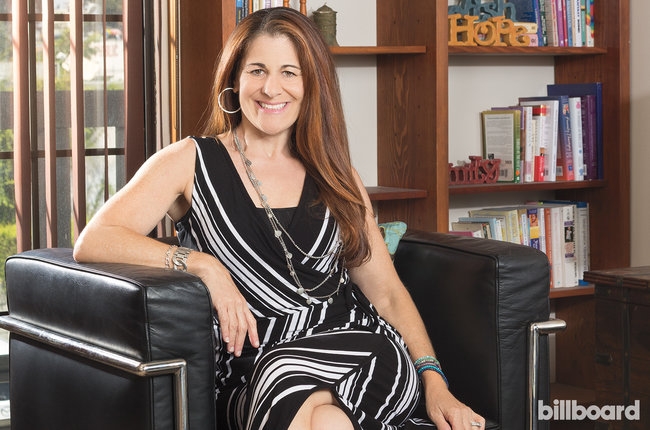In the go-go days of the music industry, Jodi Milstein climbed her way up from an intern at A&M Records to its senior director of artist relations and artist development. Along the way, she worked closely with bands like Soundgardenand Blues Traveler, co-managing Korn early on before leaving to help run Lionel Richie's touring business.
But as the Los Angeles native watched many of the acts in her orbit begin to grapple with depression and drug overdoses -- from Kurt Cobain in 1994 to Blues Traveler bassist Bobby Sheehan in 1999 -- Milstein decided to head back to school. Now, she works as a licensed marriage and family therapist and licensed professional clinical counselor, having opened her own music-world-focused therapy practice in 2008, followed by a separate RockStar Therapy website a couple of years later.
"Even as a sociology major, I thought I'd like to work with recovering teenage drug addicts; it was always this thing in my head," says Milstein, who eventually decided, "Maybe that recovering teen drug addict could also be an adult musician addict."
Charging upward of $500 per one-hour group therapy session with bands -- and sometimes their spouses -- as well as individual artists, producers and music executives, Milstein says about 75 percent of her clients come from the music world, attracted to both her familiarity with the business and her comfort level with larger-than-life stars from her days riding on tour buses. "[They] feel like I can understand that mentality," she notes.

In the wake of a fresh string of tragedies -- from Prince's fatal opioid overdose in April 2016 to the recent suicides of Soundgarden's Chris Cornell and Linkin Park's Chester Bennington -- business is, for better or worse, booming. At the same time, therapy is shedding some of its stigma in the social media age: Katy Perry livestreamed her own therapy session on YouTube in June as part of her Witness album rollout, and JAY-Z rapped, "My therapist said I relapsed," on "Smile," a track from his June album 4:44. The 2004 documentary Some Kind of Monster, which showed the members of Metallica talking out their trust issues with performance coach Phil Towle, also helped warm artists to the benefits of therapy.
From her lofted office just off of the 405 freeway deep in the San Fernando Valley, Milstein spoke to Billboard about band dynamics, contract-negotiation anxiety and how to stay married on tour.
How did you get into the music business?
It was a brief internship for college credit. I was in the video department [at A&M], and right next to it was the touring department. The head of the department [Jim Guerinot] brought me into his office and said, "You want to work here? OK. Want to start Monday?" That was my interview. The artist relations department started with the artists, whether they were new or established, and took them through all the cycles. You really got to know the emotional state of the artists.
Was that what inspired you to get your therapist license?
I just went through so many personal experiences of overdoses and depression: people I worked with, people who were one degree away from [me]. I worked so closely with Soundgarden at the beginning. I started to talk to a lot of my colleagues and say, "You know, I'm really thinking about bridging these two professions." Everyone was like, "Oh, my God. That's brilliant."

How common is it for bands now to be in therapy?
Therapy is becoming increasingly accepted. I think that bands are starting to look at that opportunity. I think the recent suicides are scaring the hell out of people. If you're in a state of desperation and hopelessness, you [might] not have had suicidal thoughts before and then, all of a sudden, it's pretty scary. Managers are now accepting it. They're including the costs for therapy in their budgets more.
Do labels pay for band therapy?
Usually managers. I had a band come in because the manager was freaking out that they wanted to fire him. The manager called me up, and we brought them in, talked about what was going on, what they were upset about, what the manager was feeling, and we were able to work that out. I think he's still with them now.
Do you see a correlation between the music and the mental health of a band?
When working with artists, I want them to maintain that creative edge. We're not trying to soften them up like, "OK, let's calm you down." It's about being able to work through that, but still use it to [maintain] that edge that an artist still has to project out into the world. If each person in a band is taking care of themselves, you've got a lot more opportunity for success than when it's all falling apart.

What are some of the common problems you see among executives?
I think it's the angst of the environment, of the industry. It's so unknown. There are people who, when A&M closed, had been there for 28 years. I think since the 2000s it's been a revolving door. Part of it is that angst about what is coming up. We'll talk a lot about how to strategize for their confidence when they go in for that renegotiation, having a sense of self and feeling deserving of that high title, and their value at that label or in that management role with that artist that might be having some frustration because their album didn't sell or whatever is going on.
Any memorable cases you can talk about?
A band that I work with wanted their spouses to come in and meet. There were eight people, just talking about them going out [on tour] and how is this going to work and how are they going to get along. Sometimes the spouses don't get along very much. [Fidelity] is an issue that comes up a lot.
How do you strategize for that?
I have to talk with the couple, because if this is the dynamic in their relationship and they've decided that they have an open relationship, then that's fine. Whatever works for you. If you have one person who is like, "No, no, no," or this person is saying, "Yes for me, no for you," you have to talk about how that's going to work. When an artist is on the road, you're, like, on a different planet; you don't even know sometimes what day it is because you have everybody taking care of you. When they come home, they don't have someone cleaning up after them. You've got to take the garbage out, because you're Joe Schmo at home. Your spouse married you as a human being. Hopefully. Not as this person who is going to be walking around with a microphone in your hand all the time. Your kids want you to drive them to school.









